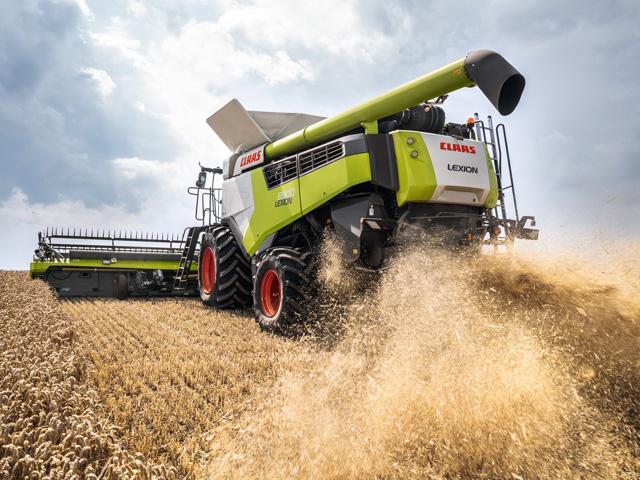CLAAS VP Raby Talks Parts, Training
CLAAS of America's Raby Talks About New Parts Delivery Strategies, Recruiting New Employees
BIRMINGHAM, Ala. (DTN) -- Eric Raby is set to become CLAAS senior vice president of the Americas Region on Friday, succeeding Leif Magnusson, who has been with the company since 2008 and will continue with the CLAAS Group in an advisory capacity.
Raby joined CLAAS of America in 2015 and has been the president and general manager of sales for CLAAS of America. In addition to his responsibilities at CLAAS of America, he will assume leadership of CLAAS sales companies in Brazil and Argentina as well as importer markets throughout Latin America.
"There are certainly big shoes to fill in this new role, but Leif has equipped me and the entire team with the confidence and drive to continue the positive trajectory that has been established for CLAAS in North and South America under his watch," Raby said.
DTN/Progressive Farmer spoke recently with Raby about the agricultural equipment manufacturing industry and CLAAS' efforts to attract young employees.
Here are some questions DTN/Progressive Farmer posed to Raby and his responses:
DTN/PF: Thanks, Eric, for sitting down with us. How's the year been for CLAAS?
P[L1] D[0x0] M[300x250] OOP[F] ADUNIT[] T[]
RABY: We had a strong year last year, even in the light of the pandemic. This year looks to be slightly better than that. I think it really goes to show the resilience of the ag economy.
DTN/PF: How did COVID affect your relationship with your farmer-customers?
RABY: We had to look at the constraints we were facing on deliveries because agriculture didn't stop. It didn't even slow down. We had to work through a few situations where we were going to be a week or two late on delivery and we had to let farmers use his equipment for a little bit longer. For example, we were running a little behind on forage head deliveries. What we were able to do is to work with the dealer and the customer, who can either use that trade-in or use another machine. And then, we would work with the dealer afterwards to help offset some of the cost of parts to refurbish it.
DTNPF: What led to the delays?
RABY: It wasn't our factories. They stayed open the whole time. It was the logistics; we really saw a slowdown in shipping channels, we saw a shortage of containers. I was working with a dealer yesterday. We had headers show up in Chicago. Now, they are in Minneapolis, and they're just moving at a snail's pace. (The dealer) has customers who want to chop silage. So, we employed what we did last year. Take (that farmer) a used header so we can get him going into the field, and then we'll work on this other part, getting him the new headers.
DTN/PF: Tell us about your ability to secure components.
RABY: We've branched out to other suppliers. It's not to completely get rid of the ones we have, but we need to disperse our risk. There are things like rubber, certain sizes of tires, we had a shortage for a period on rubber floor mats for tractors. That didn't keep us from shipping tractors. But we said, "Hey, we owe you a floor mat when they come in." But I think we're learning good lessons that we don't want to forget. We need to look farther out. Normally, we plan at least 12 months in advance (for parts and components). Now, we're looking at 18, and in some cases 24, months to secure the components needed for production.
DTN/PF: What about parts availability, delivery to your farmer-customers?
RABY: We've been measuring our fill rates. And very consistently, we've been able to keep year-over-year fill rates at a very high level. We think that's good. But we've had to do some things to make that happen. For example, we might get a number of containers in on a weekly basis. Now we've upped that number to make sure our parts supply is robust enough to take care of the demand. But the shortages have not been parts in those cases, it was a shortage of containers. One small part of that whole supply chain, which was the container to ship the parts in, became the roadblock. We did find a way around it.
DTN/PF: Tell us about the new CLAAS Academy training facility in Omaha, Nebraska, open just a few weeks. CLAAS plans to use it to help identify potential employees for your factories and your dealers, correct?
RABY: Finding employees is an issue, not only an issue for the factory, but it's also an issue for our dealers -- hiring trained field technicians. The CLAAS Academy is a 20,000-square-foot facility for dealer service technicians and, eventually, we'll do some customer training there. We also have an apprentice program. And it's specifically looking for kids that are coming out of high school or vo-tech school. We will enroll them in our program, and they learn about our business. They will learn about how machine tools work, they will learn about the manufacturing process. And they are, in fact, employees of CLAAS. When they finish the apprentice program, we'll send them out to various places throughout our channels.
Dan Miller can be reached at dan.miller@dtn.com
Follow him on Twitter @DMillerPF
(c) Copyright 2021 DTN, LLC. All rights reserved.




